Lessons from collaborating with waste workers on-the-ground in three different Global South countries
It’s feeling like déjà vu as delegations from 175 countries prepare for the 6th round of negotiations on a binding global plastics treaty in Geneva in August. This INC-5.2 session will seek to find a path forward on some familiar thorny issues: limits on plastic production, addressing chemicals of concern, financing for Global South countries and how the “instrument” will be implemented.
The informal sector is the invisible frontline of the plastic crisis
If you boil all these high-level negotiations down to what actually happens on the ground of recycling and waste management, this is what you find: the vast majority (about 80%[1]) of waste collection is done by those working in the informal economy, who collectively account for 58% of plastic recycling[2].
That means that more than half of the “made from recycled plastic” packaging and products that you see are possible because of the massive 20+ million workforce of informal waste workers – many of whom put their lives on the line through unsafe working conditions, environmental hazards, lack of social services and unfair compensation.
Despite being the engine of the recycling economy, these waste workers remain largely invisible and unrecognized. This is what many civil society organizations and countries are seeking to change through these INC-5.2 negotiations.
Bridging the talk-action gap
We see a lot of text about “just transition”, “recognition” and “improving working conditions”, which are all valid points. But what does that look like in practice?
At Delterra, we have been working closely with waste workers since day one. Below are several examples of how Delterra has been able to successfully collaborate with waste workers to improve their livelihoods and the circular economy at the same time.
Women leading the way in Buenos Aires, Argentina
Argentina’s recycling rate is under 5%, and much of the work is carried out by women in the informal economy – without recognition, training, or adequate infrastructure. Many waste workers lack access to basic equipment, safe conditions, or a path to formal employment.
These women play a critical role in keeping materials in the loop, yet their work is precarious and often invisible. Without investment in infrastructure or human development, efforts to improve recycling rates would continue to fall short, both socially and environmentally.
Thanks to the funds provided by Beiersdorf’s Women in Circularity Program, Delterra is implementing a multi-faceted program in Buenos Aires that empowers female waste workers through in four main interventions:
-
- Plastics recycling infrastructure and safety upgrades
We upgraded seven Green Centers (material recovery facilities) with new balers, additional sorting belts and chutes, safety gear and digital tools. These centers now process higher volumes of plastic waste and have improved worker safety. - Upskilling and educating cooperative waste workers
In partnership with Austral University, we designed and delivered customized curricula to train over 500 cooperative workers and 58 female promoters, helping them become professionals in the recycling value chain. - Behavior change though a train-the-trainer model
We trained 58 municipal female environmental promoters to lead door-to-door campaigns, improving waste separation and recycling habits in Buenos Aires. Together, they delivered Delterra’s three-stage user-centered program informed by User profiles, Journey Maps, and a Service Blueprint that reached 160,000 households (>500,000 people) in just 18 weeks. - Investment in a new flexible plastics plant operated by women
We designed and built a flexible plastics washing plant at Buenos Aires’ southern Recycling Center, operated by previously unemployed women with experience in waste picking and sorting. Opened in May 2025, the facility was co-developed with Cooperativa Baires and the Government of the City of Buenos Aires.
- Plastics recycling infrastructure and safety upgrades
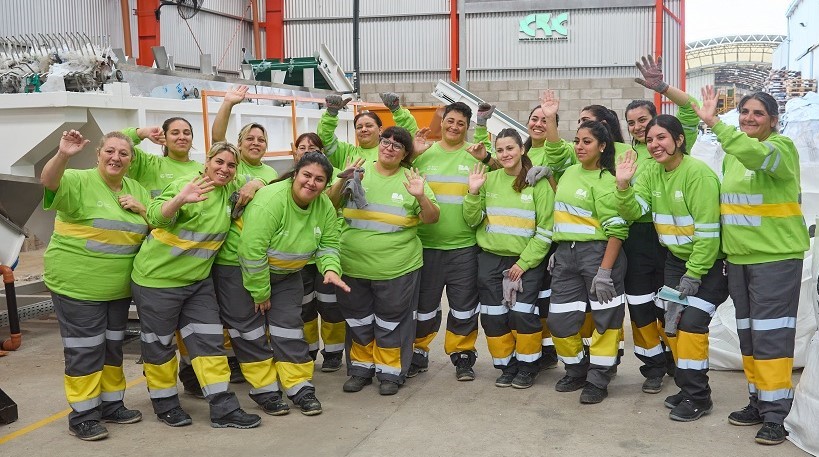
The program delivered tangible impact for plastics recycling and waste workers livelihoods:
-
-
- An estimated 3,000+ additional tons of plastic recycled annually
- More than 250 women directly trained, with hundreds more benefiting from improved workplace standards
- 6 upgraded sorting centers, now better connected to downstream recyclers for hard-to-recycle plastics like LDPE and PP
- And a new plant in the City of Buenos Aires to increase flexible plastics recycling, operated by 12 women.
-
This kind of systemic transformation demonstrates what’s possible when circularity is designed with dignity and inclusion in mind.
Improving conditions for frontline waste workers in Bali, Indonesia
Village-level waste systems in Bali are fragmented, underfunded and lack standardization. Waste workers and local educators often face low pay, poor safety protections and limited advancement, despite being critical to recycling systems. This underinvestment leads to informal, inconsistent and inefficient waste collection and processing, leaving workers vulnerable and limiting community recycling efforts.
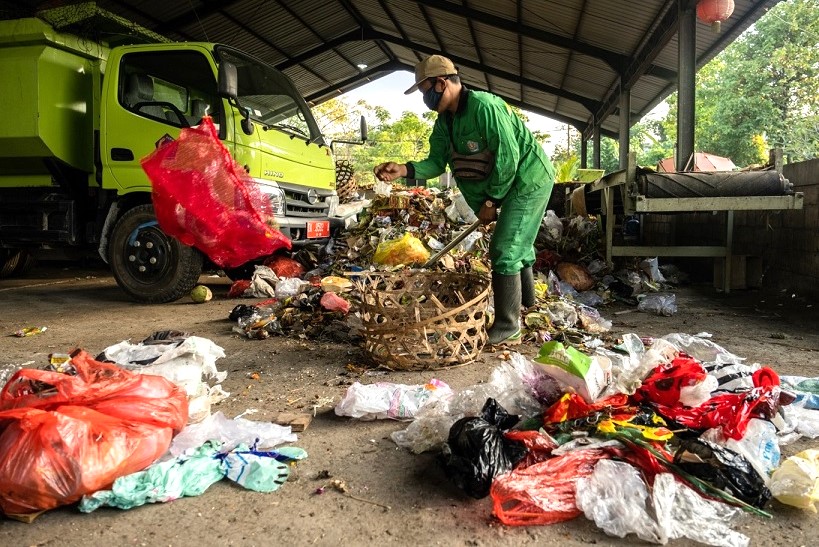
To address this challenge, Delterra has implemented several initiatives aimed at economically empowering waste workers and integrating them more fully into the formal workforce.
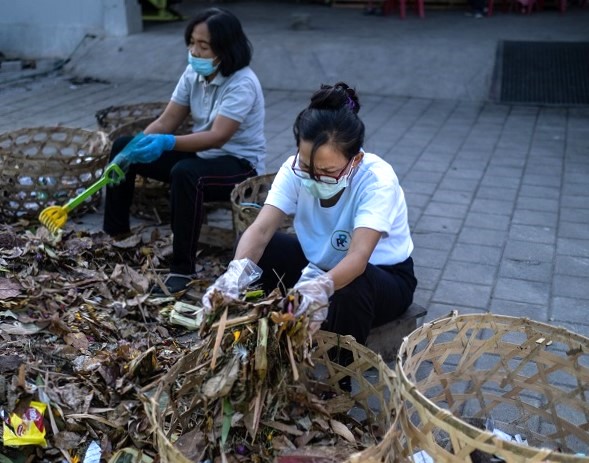 In Denpasar, Bali, we helped unlock increased public funding for local villages, enabling local governments to hire waste workers at wages above the regional minimum and to provide essential health and safety benefits. We also ensured that community educators receive stipends where possible in recognition of their vital contributions. Additionally, we supported income generation by helping village collectors secure fair market prices for recycled materials.
In Denpasar, Bali, we helped unlock increased public funding for local villages, enabling local governments to hire waste workers at wages above the regional minimum and to provide essential health and safety benefits. We also ensured that community educators receive stipends where possible in recognition of their vital contributions. Additionally, we supported income generation by helping village collectors secure fair market prices for recycled materials.
To professionalize the sector, Delterra is providing ongoing training and mentorship. Waste workers receive training to manage facilities safely and efficiently, while local educators – who lead community waste separation programs – are trained to improve their delivery and engagement. These capacity-building efforts have shown consistent results in improving job security, performance and working conditions. We have:
-
-
- Trained over 300 waste workers and officials in Denpasar and Badung in the last five years to increase their productivity and safety
- Partnered with 10+ communities and local governments to establish Waste Management Units, policies and increased public funding for waste management
- Delivered train-the-trainer workshops on source separation to over 60 local educators, stakeholder and government officials
-
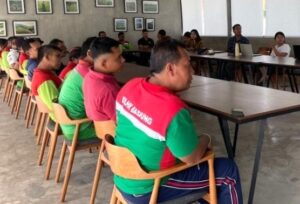 We work closely with local stakeholders to understand existing challenges and tailor improvements that center and uplift waste workers and educators.
We work closely with local stakeholders to understand existing challenges and tailor improvements that center and uplift waste workers and educators.
These efforts increased system reliability, efficiency and worker education while laying the foundation for more effective waste systems across Bali.
Strengthening informal livelihoods through behavior change in Guaxupé, Brazil
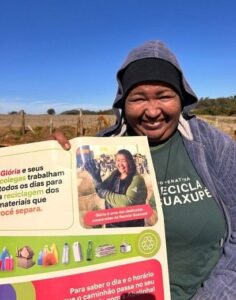 In Guaxupé, a small city in Brazil, recycling participation was low. Households were unaware of proper sorting practices, and waste pickers struggled to access clean materials.
In Guaxupé, a small city in Brazil, recycling participation was low. Households were unaware of proper sorting practices, and waste pickers struggled to access clean materials.
That is why Delterra launched a citywide behavior change program in Guaxupé in collaboration with Recicleiros, which has previous experience with local waste workers. This work was grounded in deep ethnographic research to understand local cultural dynamics, attitudes toward waste and barriers to recycling. The team developed multiple user profiles and mapped key pain points across the existing system, informing tailored strategies that would resonate with residents.
The result: a community-wide rollout that reached over 20,000 households and more than doubled recycling rates (up to 3.5x at the peak).
While the goal was to increase formal participation in recycling, the intervention also had a ripple effect on the city’s waste sector – particularly the waste pickers who depend on recyclables for their income.
To better understand this shift, Delterra conducted follow-up interviews with a research sample of 11 waste pickers. Their feedback was telling. Across the board, they reported:
-
- An increase in personal income
- Greater availability of clean, sorted recyclables
- Reduced need to sort through contaminated waste
These findings highlight how behavior change strategies—when thoughtfully designed and grounded in local culture – can improve livelihoods while strengthening the environmental outcomes of waste systems. As cities around the world seek to scale climate solutions, the case of Guaxupé reminds us that climate action and social equity must go hand in hand.
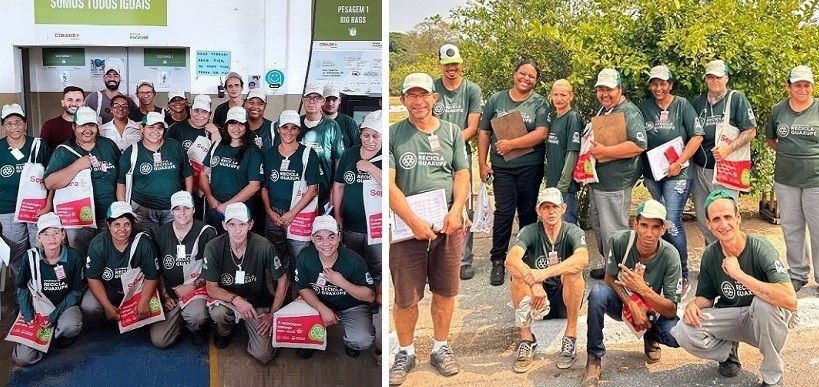
What INC-5.2 needs to recognize
As negotiators gather at INC-5.2 to advance the Global Plastics Treaty, Delterra’s work offers a vital reminder: policies must support people.
Delterra’s projects show that investing in inclusive waste systems delivers tangible benefits for both environmental and social outcomes. Negotiators need to listen to and include the 20+ million voices of those driving the global recycling economy.
We are on YouTube!
 We’re excited to launch our official YouTube channel > Watch now
We’re excited to launch our official YouTube channel > Watch now
🔔 Subscribe now and join us on the journey to bridge global commitments with local action. From behind-the-scenes looks at our programs to inspiring stories of change and engaging webinars—you’ll find it all here. Discover real-world strategies for the transition to a circular economy.
Subscribe & share
Be sure to subscribe to our newsletter. And share with a friend to get real world insights and practical actions for a circular economy!
[1] Fair Circularity Initiative & Systemiq, 2024
[2] UNEP, 2023
